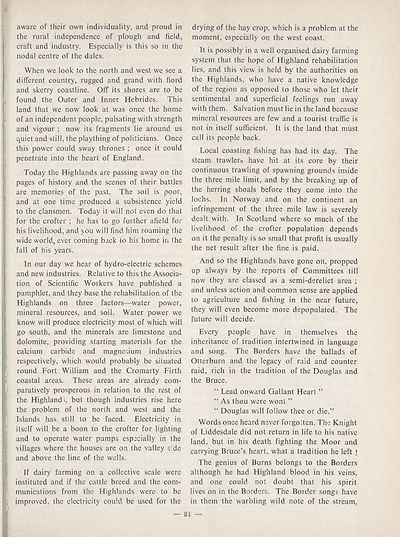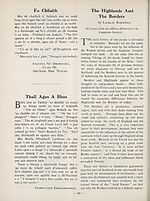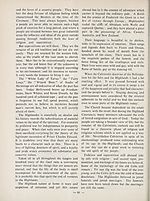An Comunn Gàidhealach Publications > Gaidheal > Volumes 58--62(part), January, 1963--March 1967
(115) Page 81
Download files
Complete book:
Individual page:
Thumbnail gallery: Grid view | List view

aware of their own individuality, and proud in
the rural independence of plough and field,
craft and industry. Especially is this so in the
nodal centre of the dales.
When we look to the north and west we see a
different country, rugged and grand with fiord
and skerry coastline. Off its shores are to be
found the Outer and Inner Hebrides. This
land that we now look at was once the home
of an independent people, pulsating with strength
and vigour ; now its fragments lie around us
quiet and still, the plaything of politicians. Once
this power could sway thrones ; once it could
penetrate into the heart of England.
Today the Highlands are passing away on the
pages of history and the scenes of their battles
are memories of the past. The soil is poor,
and at one time produced a subsistence yield
to the clansmen. Today it will not even do that
for the crofter ; he has to go further afield for
his livelihood, and >ou will find him roaming the
wide world, ever coming back to his home in the
fall of his years.
In our day we hear of hydro-electric schemes
and new industries. Relative to this the Associa¬
tion of Scientific Workers have published a
pamphlet, and they base the rehabilitation of the
Highlands on three factors—water power,
mineral resources, and soil. Water power we
know will produce electricity most of which will
go south, and the minerals are limestone and
dolomite, providing starting materials for the
calcium carbide and magnesium industries
respectively, which would probably be situated
round Fort William and the Cromarty Firth
coastal areas. These areas are already com¬
paratively prosperous in relation to the rest of
the Highlands, but though industries rise here
the problem of the north and west and the
Islands has still to be faced. Electricity in
itself will be a boon to the crofter for lighting
and to operate water pumps especially in the
villages where the houses are on the valley side
and above the line of the wells.
If dairy farming on a collective scale were
instituted and if the cattle breed and the com¬
munications from the Highlands were to be
improved, the electricity could be used for the
drying of the hay crop, which is a problem at the
moment, especially on the west coast.
It is possibly in a well organised dairy farming
system that the hope of Highland rehabilitation
lies, and this view is held by the authorities on
the Highlands, who have a native knowledge
of the region as opposed to those who let their
sentimental and superficial feelings run away
with them. Salvation must lie in the land because
mineral resources are few and a tourist traffic is
not in itself sufficient. It is the land that must
call its people back.
Local coasting fishing has had its day. The
steam trawlers have hit at its core by their
continuous trawling of spawning grounds inside
the three mile limit, and by the breaking up of
the herring shoals before they come into the
lochs. In Norway and on the continent an
infringement of the three mile law is severely
dealt with. In Scotland where so much of the
livelihood of the crofter population depends
on it the penalty is so small that profit is usually
the net result after the fine is paid.
And so the Highlands have gone on, propped
up always by the reports of Committees till
now they are classed as a semi-derelict area ;
and unless action and common sense are applied
to agriculture and fishing in the near future,
they will even become more depopulated. The
future will decide.
Every people have in themselves the
inheritance of tradition intertwined in language
and song. The Borders have the ballads of
Otterburn and the legacy of raid and counter
raid, rich in the tradition of the Douglas and
the Bruce.
“ Lead onward Gallant Heart ”
“ As thou were wont ”
“ Douglas will follow thee or die.”
Words once heard never forgotten. The Knight
of Liddesdale did not return in life to his native
land, but in his death fighting the Moor and
carrying Bruce’s heart, what a tradition he left i
The genius of Burns belongs to the Borders
although he had Highland blood in his veins,
and one could not doubt that his spirit
lives on in the Borders. The Border songs have
in them the warbling wild note of the stream,
— 81 —
the rural independence of plough and field,
craft and industry. Especially is this so in the
nodal centre of the dales.
When we look to the north and west we see a
different country, rugged and grand with fiord
and skerry coastline. Off its shores are to be
found the Outer and Inner Hebrides. This
land that we now look at was once the home
of an independent people, pulsating with strength
and vigour ; now its fragments lie around us
quiet and still, the plaything of politicians. Once
this power could sway thrones ; once it could
penetrate into the heart of England.
Today the Highlands are passing away on the
pages of history and the scenes of their battles
are memories of the past. The soil is poor,
and at one time produced a subsistence yield
to the clansmen. Today it will not even do that
for the crofter ; he has to go further afield for
his livelihood, and >ou will find him roaming the
wide world, ever coming back to his home in the
fall of his years.
In our day we hear of hydro-electric schemes
and new industries. Relative to this the Associa¬
tion of Scientific Workers have published a
pamphlet, and they base the rehabilitation of the
Highlands on three factors—water power,
mineral resources, and soil. Water power we
know will produce electricity most of which will
go south, and the minerals are limestone and
dolomite, providing starting materials for the
calcium carbide and magnesium industries
respectively, which would probably be situated
round Fort William and the Cromarty Firth
coastal areas. These areas are already com¬
paratively prosperous in relation to the rest of
the Highlands, but though industries rise here
the problem of the north and west and the
Islands has still to be faced. Electricity in
itself will be a boon to the crofter for lighting
and to operate water pumps especially in the
villages where the houses are on the valley side
and above the line of the wells.
If dairy farming on a collective scale were
instituted and if the cattle breed and the com¬
munications from the Highlands were to be
improved, the electricity could be used for the
drying of the hay crop, which is a problem at the
moment, especially on the west coast.
It is possibly in a well organised dairy farming
system that the hope of Highland rehabilitation
lies, and this view is held by the authorities on
the Highlands, who have a native knowledge
of the region as opposed to those who let their
sentimental and superficial feelings run away
with them. Salvation must lie in the land because
mineral resources are few and a tourist traffic is
not in itself sufficient. It is the land that must
call its people back.
Local coasting fishing has had its day. The
steam trawlers have hit at its core by their
continuous trawling of spawning grounds inside
the three mile limit, and by the breaking up of
the herring shoals before they come into the
lochs. In Norway and on the continent an
infringement of the three mile law is severely
dealt with. In Scotland where so much of the
livelihood of the crofter population depends
on it the penalty is so small that profit is usually
the net result after the fine is paid.
And so the Highlands have gone on, propped
up always by the reports of Committees till
now they are classed as a semi-derelict area ;
and unless action and common sense are applied
to agriculture and fishing in the near future,
they will even become more depopulated. The
future will decide.
Every people have in themselves the
inheritance of tradition intertwined in language
and song. The Borders have the ballads of
Otterburn and the legacy of raid and counter
raid, rich in the tradition of the Douglas and
the Bruce.
“ Lead onward Gallant Heart ”
“ As thou were wont ”
“ Douglas will follow thee or die.”
Words once heard never forgotten. The Knight
of Liddesdale did not return in life to his native
land, but in his death fighting the Moor and
carrying Bruce’s heart, what a tradition he left i
The genius of Burns belongs to the Borders
although he had Highland blood in his veins,
and one could not doubt that his spirit
lives on in the Borders. The Border songs have
in them the warbling wild note of the stream,
— 81 —
Set display mode to:
![]() Universal Viewer |
Universal Viewer | ![]() Mirador |
Large image | Transcription
Mirador |
Large image | Transcription
| An Comunn Gàidhealach > An Comunn Gàidhealach Publications > Gaidheal > Volumes 58--62(part), January, 1963--March 1967 > (115) Page 81 |
|---|
| Permanent URL | https://digital.nls.uk/127150161 |
|---|
| Description | This contains items published by An Comunn, which are not specifically Mòd-related. It includes journals, annual reports and corporate documents, policy statements, educational resources and published plays and literature. It is arranged alphabetically by title. |
|---|
| Description | A collection of over 400 items published by An Comunn Gàidhealach, the organisation which promotes Gaelic language and culture and organises the Royal National Mòd. Dating from 1891 up to the present day, the collection includes journals and newspapers, annual reports, educational materials, national Mòd programmes, published Mòd literature and music. |
|---|---|
| Additional NLS resources: |
|

